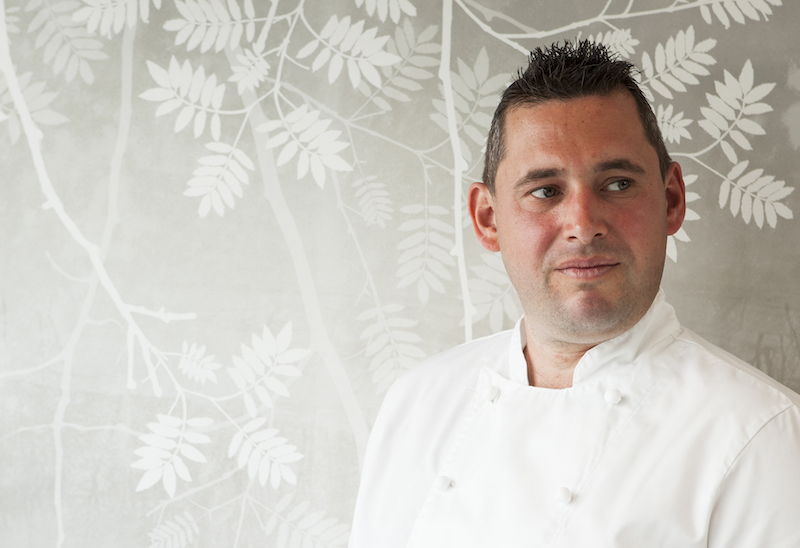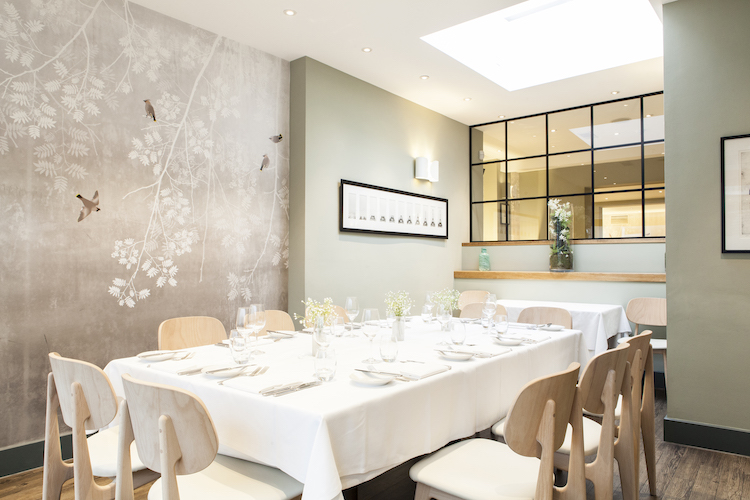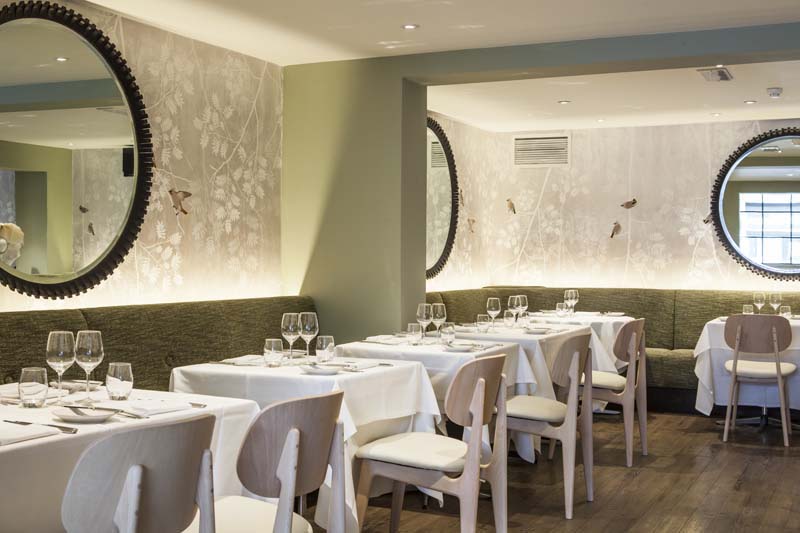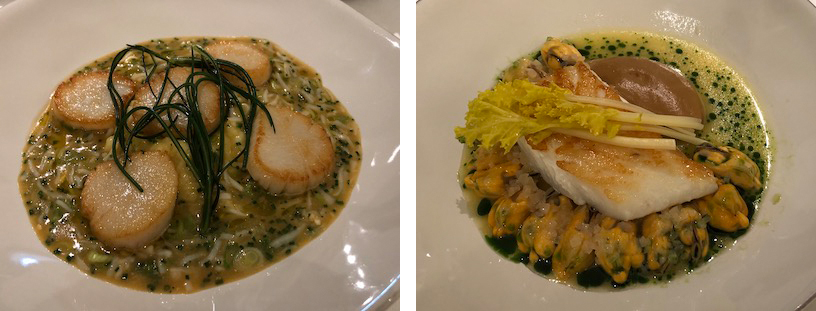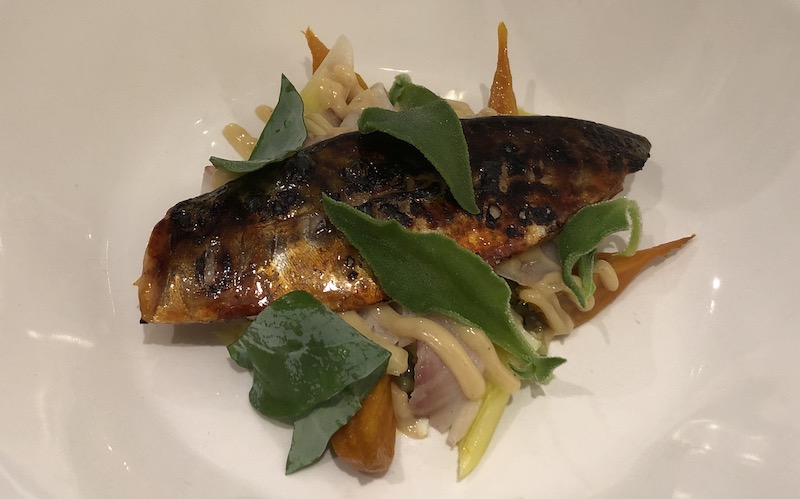
After the exciting regional finals in London and Birmingham, the Roux family is delighted to announce the names of the six chefs who will compete for the title of Roux Scholar 2019 on 1st April 2019.
| They are: |
| Ryan Baker, The Ritz, London Olivia Catherine Burt, Claridge’s, London Michael Cruickshank, Bohemia, Jersey Adam Harper, The Cavendish Hotel at Baslow, Derbyshire Lewis Linley, Vacherin, London Spencer Metzger, The Ritz, London One reserve (who will compete if a chef has to drop out): Samuel Nash, L’Enclume, Cartmel, Cumbria |
Judging in London, at University of West London, Michel Roux Jr said: “Amazing standard. Every year it just gets better and better and the correctness of the cooking and the seasoning was beyond reproach.” Many of the judges were impressed by how evident it was that the chefs had practised their dishes over and over. James Martin said: “They’d all practised, practised, practised, and you can tell. Those who’ve practised have really nailed it.”
Two of the finalists come from The Ritz, Spencer Metzger, who competed in Birmingham, and Ryan Baker, who competed in London, both of whom entered for the first time this year. Ryan said: “I’m ecstatic that I got through. I’m really excited about taking the next step. I practised on all my days off, over the last couple of months – practised, practised, practised, and it really paid off.”
Meanwhile, Olivia Catherine Burt from Claridge’s also entered for the first time this year. “I’m super-excited. It’s a really big achievement. I practised from the moment I heard I’d got through. It’s always quite difficult work and practising. I’ve had lots of support from my head chef Martyn [Nail] and also Matt [Starling] from when I worked at Fera.”
Meanwhile in Birmingham, some of the chefs struggled to cook their dishes and the mystery box dessert within the time given. Judge Angela Hartnett said: “My advice would be to future entrants: when thinking about the paper entry, save time for the dessert.”
Chairman Alain Roux said: “There was a level of complexity in a lot of the dishes, which cannot be easy to execute at that level. The result was that the desserts were not so well-executed and they should have properly cooked and poached the fruit.”
Facts about the finalists:
- Michael Cruickshank was in the national final in 2017, and the regional final in 2016 and 2018.
- Two of the finalists, Ryan Baker and Spencer Metzger work for The Ritz, in Chef John Williams’ Brigade.
- Olivia Catherine Burt is the first female finalist since Sabrina Gidda in 2014 and 2015.
- Five out of the six finalists have got through on their first time of entering the competition: Ryan Baker, Olivia Catherine Burt, Adam Harper, Spencer Metzger and Lewis Linley.
The finalists were chosen following two regional finals, which took place on Thursday 14th March 2019at the University of West London, Ealing, and University College Birmingham.
Judges
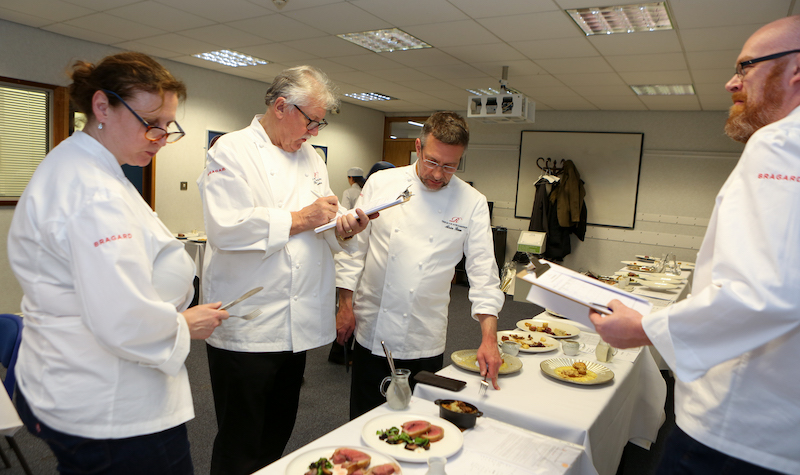
In Birmingham (above): Alain Roux, Brian Turner, Simon Hulstone (scholar 2003), Angela Hartnett.
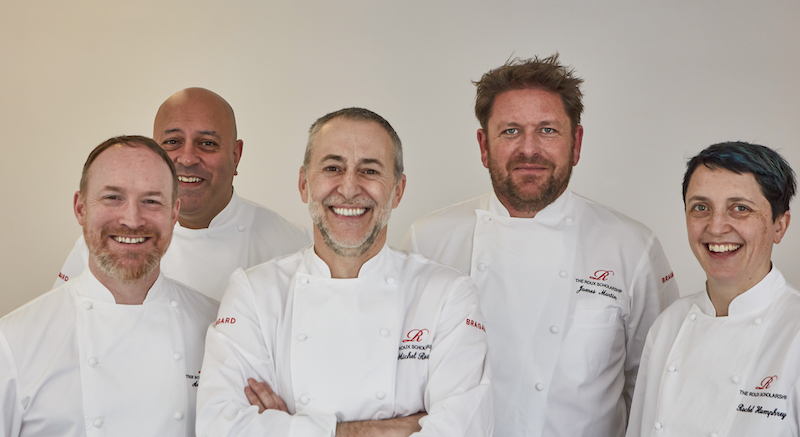
In London (above): Michel Roux Jr, Sat Bains (scholar 1999), Rachel Humphrey, James Martin and André Garrett (Roux Scholar 2002).
The challenge
This year’s challenge was to create a recipe to serve four people using one short saddle of hogget, weighing between 1.8kg and 2.2kg (bone-in, breast removed, without kidneys) and using four hogget kidneys (whole, suet removed); together served plated with two ‘simple’ or ‘composed’ garnishes/accompaniments. One of them had to be a potato rösti and the other to be a garnish/accompaniment of their choice. A sauce had to accompany the dish. Competitors had 2½ hrs to cook their dish, along with a dessert from a mystery box of ingredients given to them on the day.
The 2019 mystery box
The brief was to prepare a dessert for four people
using the ingredients supplied.
One ingredient could be omitted but at least 50% of the following ingredients
had to be used:
| 200ml double cream 4 medium eggs 100g plain flour 100g golden syrup 150g unsalted butter | 80g fresh ginger root 4 oranges 4 medium-sized Cox apples 500ml Thatchers Katy cider |
Quotes from the chairmen:
Michel Roux Jr: “Amazing standard. Every year it just gets better and better and the correctness of the cooking and the seasoning was beyond reproach.”
Alain Roux: “There was a level of complexity in a lot of the dishes, which cannot be easy to execute at that level. The result was that the desserts were not so well-executed and they should have properly cooked and poached the fruit. All of the chefs showed an impressive level of skill. We would expect more simplicity next year. They need to improve their palate and need to taste their food.”
Comments from Birmingham judges:
Simon Hulstone: “You’ve got to factor in that if you’re not cooking in your own kitchen you should add half an hour to your preparation and cooking time. It meant that some struggled in the time given.”
Angela Hartnett: “One of the guys who went through had produced one of the best sauces I has even tasted in this competition. My advice would be to future entrants: when thinking about the paper entry, save time for the dessert.”
Comments from London judges said:
Sat Bains: “It’s a really good year – I’m impressed. It’s always difficult under pressure. It’s a really strong year and I enjoyed tasting all the food.”
James Martin: “They’d all practised, practised, practised, and you can tell. Those who’ve practised have really nailed it.”
National final – Monday 1st April 2019
The six finalists will compete for the title of Roux Scholar 2019 in the final, which takes place at Westminster Kingsway College, London. This time the recipe details will be a complete surprise; 30 minutes before the start of the competition the finalists will be given the recipe and ingredients for a main dish, either classic or modern and given three hours to prepare and present it to the judges.
Acclaimed Australian chef Peter Gilmore will join the panel of judges as Honorary President, alongside joint chairmen Alain and Michel Jr. They will be joined by Brian Turner, James Martin, Clare Smyth as well as previous winners Sat Bains (1999 scholar) and André Garrett (2002 scholar).
Award Ceremony
The 2019 Roux Scholar will be announced at a prestigious award ceremony at the Mandarin Oriental Hyde Park, London, that same evening. The winner will receive £6000, a three-month stage at a three-star Michelin restaurant anywhere in the world, and a number of superb prizes from our sponsors.
Our sponsors
The Roux Scholarship is sponsored by a number of companies including: Aubrey Allen, Bridor, Cactus TV, The Caterer, Direct Seafoods, Global Knives, Hildon Natural Mineral Water, Champagne Laurent-Perrier, L’Unico Caffe Musetti, Mandarian Oriental Hyde Park, Mash Purveyors Ltd, Oritain, Qatar Airways, Restaurant Associates, TRUEfoods, and Udale Speciality Foods Ltd.
More details about all 18 chefs who competed and all of our sponsors are available on our website www.rouxscholarship.co.uk
Quotes from the finalists – coming later today [15th March].
Regional Prizes
Each competitor received the following gifts from our sponsors, as well as a commemorative certificate signed by all the judges:
- A Kazoku set of three Global Knives.
- A cafetière pot with coffee, courtesy of L’Unico Caffé Musetti.
- A TRUEfoods notebook and tasting spoon.
- A fruit hamper from Mash Purveyors.
Details of the National prize can be found here: www.rouxscholarship.co.uk/prizes/










